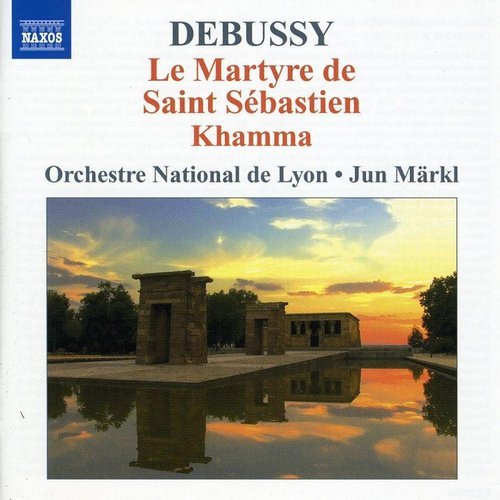
Orchestre National de Lyon, Jun Markl - Debussy - Le Martyre de Saint Sébastien / Khamma (2010)
BAND/ARTIST: Orchestre National de Lyon, Jun Markl
- Title: Debussy - Le Martyre de Saint Sébastien / Khamma
- Year Of Release: 2010
- Label: Naxos
- Genre: Classical
- Quality: FLAC (tracks)
- Total Time: 01:01:14
- Total Size: 208 Mb
- WebSite: Album Preview
Tracklist:
Le martyre de St. Sebastien: Fragments symphoniques
01. No. 1. La cour de lys (from Act I: Prelude) 00:03:39
02. No. 2. Danse extatique et Final (from Act I) 00:07:20
03. No. 3. La Passion (from Act III) 00:05:52
04. No. 4. Le bon pasteur (from Act IV) 00:05:55
05. Le martyre de St. Sebastien, Act II. La chambre magique: Prelude 00:04:07
06. Fanfare No. 1 00:01:51
07. Fanfare No. 2 00:00:28
08. Khamma 00:21:59
09. Fanfare d'ouverture 00:01:37
10. Le sommeil de Lear 00:02:47
11. L'enfant prodigue: Cortege et Air de danse 00:04:59
Le martyre de St. Sebastien: Fragments symphoniques
01. No. 1. La cour de lys (from Act I: Prelude) 00:03:39
02. No. 2. Danse extatique et Final (from Act I) 00:07:20
03. No. 3. La Passion (from Act III) 00:05:52
04. No. 4. Le bon pasteur (from Act IV) 00:05:55
05. Le martyre de St. Sebastien, Act II. La chambre magique: Prelude 00:04:07
06. Fanfare No. 1 00:01:51
07. Fanfare No. 2 00:00:28
08. Khamma 00:21:59
09. Fanfare d'ouverture 00:01:37
10. Le sommeil de Lear 00:02:47
11. L'enfant prodigue: Cortege et Air de danse 00:04:59
The fourth volume of Naxos' survey of Debussy's orchestral works delves deeper into repertoire that is far less likely to be familiar to most listeners. The vast majority of the program is devoted to incidental music, including Debussy's music for the controversial Le martyre de Saint Sebastien, which was banned by the Catholic Church. The opening four sections are termed symphony fragments and are sometimes played as a stand-alone set. Debussy's writing for Khamma and Le roi Lear are even more obscure and were not actually even orchestrated by Debussy himself. The final selection, L'enfant prodigue, won Debussy the coveted Prix de Rome in 1884 and bares a stronger resemblance to the writing with which listeners are more accustomed. Performing this rather peculiar program is the Orchestre National de Lyon under conductor Jun Märkl. With such a lackluster program, listeners would hope for a performance that would bring the works to life with vibrant textures, sweeping musical gestures, and pristine playing. Märkl and orchestra fall short of this mark, however. While there are no blatant, egregious errors, there's also little in the way of intensity and verve. Balance issues in the orchestra -- particularly from the brash brass -- are sometimes allowed to slip by, and the performances in general seem to lack commitment and decisiveness. The literature on this disc is not frequently so listeners may still find it worthwhile, but no one should be expecting any sort of profound, moving musical experience here.
As a ISRA.CLOUD's PREMIUM member you will have the following benefits:
- Unlimited high speed downloads
- Download directly without waiting time
- Unlimited parallel downloads
- Support for download accelerators
- No advertising
- Resume broken downloads


